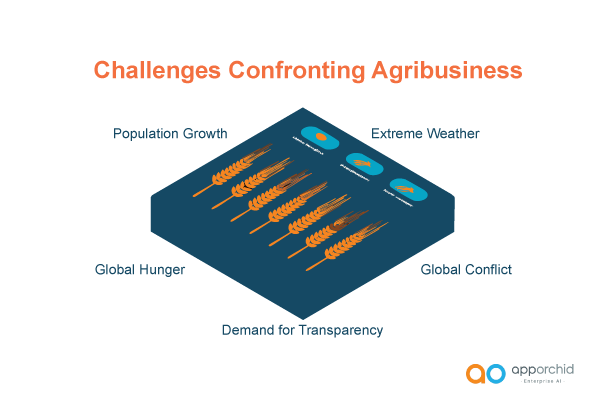Evolution and business have always gone hand in hand. From the earliest days of industry, companies have had to adapt to overcome both current and future challenges. But these pressures aren’t felt equally across all sectors, and agriculture is one that faces a unique, ever-growing set of complexities.
Agribusinesses must navigate issues from yield management to production optimization, resource constraints, and revenue generation. Enterprise AI offers transformative solutions to help tackle these challenges, empowering agricultural organizations with better resource allocation, increased yields, reduced waste, and actionable insights.
Common Challenges Agribusiness is Turning to Enterprise AI to Address

1. Yield Management and Predictive Insights
Agricultural yield management is one of the most critical areas enterprise-AI can address, with technology helping growers balance demand and supply. For instance, the App Orchid platform created machine learning models that forecast yield, using over a decade of data including time series, weather patterns, and specific production grade information. By analyzing these factors along with pollination, weather, and wind data from partners like Fracsun, App Orchid accurately predicts output for the upcoming quarters. This type of data-driven yield management allows enterprises to optimize their commitments to suppliers and fulfill orders, ultimately reducing waste by aligning supply with demand.
2. Production Optimization
In agricultural production, efficient scheduling can be a game-changer, directly impacting costs and productivity. App Orchid’s platform helps streamline production scheduling by correlating machine performance data with labor and demand. By integrating with systems like Kronos (for labor) and analyzing throughput data, App Orchid can identify inefficiencies and suggest ways to reduce downtime. For example, an AI model that considers machine variance, labor costs, and demand fluctuations can optimize workforce allocation, leading to substantial savings on labor costs and minimizing waste.
3. Reducing Waste and Improving Resource Utilization
One of the biggest challenges in agriculture is minimizing waste. Fruit production, for example, for almonds sees about 80% of raw materials go to waste due to shells and other byproducts. AI-driven analysis helps in identifying which inputs yield the best results, allowing growers to focus on specific produce types and grades that maximize usable output. By leveraging historical data and predicting optimal months for production—August, in the case of almonds—AI tools assist in decision-making that can significantly cut waste while boosting efficiency.
4. Market and Climate Variability
Agriculture faces unique challenges related to market and climate fluctuations. By building models that factor in variables like weather, pollination cycles, and seasonal shifts, AI can provide forecasts that help enterprises anticipate and adapt to these changes. For instance, App Orchid’s models predict how changing weather conditions over the next quarter could impact production. This insight empowers enterprises to adapt their strategies proactively, reducing the impact of adverse conditions and aligning supply chains to real-time environmental shifts.
Moving Forward with Enterprise AI in Agribusiness
Enterprise AI is proving to be a powerful tool for agriculture, addressing complex challenges with innovative, data-driven solutions. Our integrated offering to agribusiness extends across crop monitoring and yield prediction, labor optimization to consumer preference analysis.
- Precision Agriculture
- Energy & Fertilizer Management
- Foor Ingredient Innovation
- Labor Optimization
- Supply Chain Optimization
- Market Analysis & Demand Management
App Orchid offers the insights and efficiencies agribusiness needs to thrive. As more companies adopt these technologies, we’ll continue to see significant advancements in agricultural productivity and sustainability.
Getting started
We don’t believe in lengthy, complicated and over-engineered implementation processes. MVP in as little as 8 to 12 weeks. Reach out to get started.

